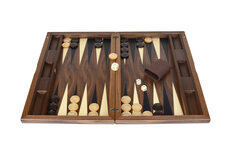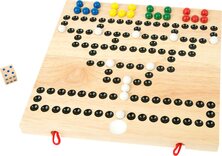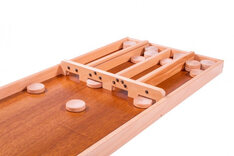Ludo and Pachisi
Ludo is, in fact, the modern classic children's version of the ancient Indian game Pachisi. The word Ludo is Latin for 'play' and it's a straightforward race game with the objective being to be the first to get all 4 of your Ludo pieces to the home area in the middle. But, just because Ludo is designed for children doesn't mean that you or they should have to put up with horrible plastic pieces on a thin card board! Below we have a fine selection of beautiful boards to allow you to enjoy this great game.
History of Pachisi and Ludo
Pachisi (also spelt Parcheesi, Parchisi, Parchisi, Parchesi; also known as Twenty-Five) is the National Game of India. The name comes from the Indian word "pacis" which means twenty five, the highest score that could be thrown with the cowry shells. Pachisi is, in fact, the younger sister of Chaupar (or Chausar, Chaupad, Chaupat, Chopat or Chopad), a more venerable, complex and skilful game that is still played in India. The Indian Emperor Akbar I of the 16th century Mogul Empire, apparently played Chaupar on great courts constructed of inlaid marble. He would sit on a Dias four feet high in the centre of the court and throw the cowry shells. On the red and white squares around him, 16 beautiful women from the harem, appropriately coloured, would move around according to his directions. The origins of Pachisi and Chaupar are lost in time but uncertain evidence indicates that forms of the game were in existence in the Indian region from at least the 4th century AD. Both have hardly changed since Emperor Akbar played although the game is not as widely played in India as it once was. Pachisi boards as played in the street are often constructed of cloth, 6 cowry shells are thrown to determine the moves and the counters are made of wood in a beehive shape. Pachisi is a 'Cross and Circle' game, variations of which appear all over the world In 1896, a westernised version of Pachisi was published in England under the name Ludo (Latin for "I play"), a game which has been popular in that country ever since. The game however, is a simplistic version of Pachisi for children. In America, an analagous simplified version appeared called Parcheesi which was for decades, Selchow & Richter's bestselling game. You can learn more about the history of Ludo and Pachisi from The Online Guide to Traditional Games.





































